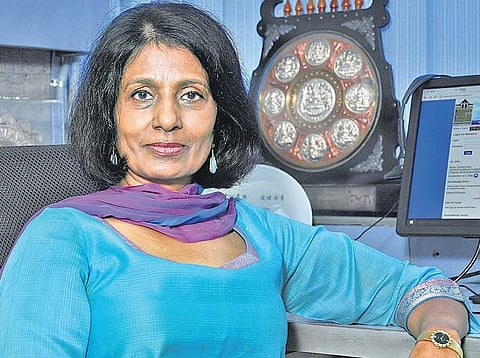

CHENNAI:Twenty-six years ago, Lakshmi V Venkatesan, a Masters degree holder in Physics and Engineering Science, decided to give back to the society, as a result of the values she grew up with as a child. “I spent close to two decades abroad, heard the call of the nation in the 90s and returned to India. Back then, people who moved to America hardly came back. But I grew up with certain core values...so, I always knew I would come back and serve my country in some way,” says Lakshmi, daughter of the former President of India, R Venkataraman. In 1992, she founded Bharatiya Yuva Shakti Trust (BYST), with a mission of converting underserved job seekers in rural and urban areas into job creators, with the doyen of industry world — Late JRD Tata. In a tête-a-tête, she walks us through her serendipitous journey. Excerpts follow.
If you take a trip down the memory lane, what do you think was the most defining moment
BYST was serendipity and I am glad I had a role in making it happen. My background was focused on Science and early technology (in the late 70s). I founded BYST after a successful career for a decade with AT&T-Bell Laboratories, USA, as a telecommunication system engineer and project manager. But the defining moment was in 1990, where I was with my father on a state visit to the UK. I had the opportunity to sit next to the Prince of Wales and he told me about one of his interesting programmes, Prince’s Trust. I was fascinated by it — about choosing young people who were school dropouts, from an underprivileged background and making them successful entrepreneurs. So, I thought of starting a similar mentoring concept in India. And 26 years later, BYST has created awareness and counselled 5,00,000 youth, helped set up 7,000 ventures, facilitated loan disbursement of `200 crore through public sector banks and generated direct/indirect employment for 2,50,000 with a success rate of 95 per cent.
Did your father influence your decisions?
My father let me grow independently and allowed me to take my own decisions. We were not entitled to become something, without working hard for it. When I chose to go abroad to do my Master’s in Engineering, he agreed. It was not common to send girls abroad to pursue education, in the late 70s and early 80s. I had to work my way through everything and nothing came easy.
What did being a part of an established family mean to you?
On one hand, ours was a normal, middle class, Tamil family. On the other, I had experiences which were different. I used to go for vacations, which were different from the norm. My father used to go to hydro-electric stations...back then Mettur dam was new and hydro-power plants were coming up. My vacations were going around these power plants. As a 10-year-old, anytime it didn’t rain, I would think of the consequences — no water and hence power cuts. Social issues and what was happening around us were what I grew up with. My father used to write about the factories that he visited in Japan,and Hong Kong, and what they were like. He engaged me in the larger issues. But like any household, there was an emphasis on education.
What’s your typical day like?
I am not the best person to talk about work-life balance. I am either doing my work or reading about today’s technology, its future and how it shapes young lives. I also practice yoga, meditation and mindfulness.
How would you describe yourself?
I wouldn’t call myself driven or ambitious. I would call myself passionate. I was never brought up thinking that it was a legacy to follow my father’s footsteps, or that I was entitled to become someone. But, I was brought up with the value of doing something for the country. Incidentally, my father was known for industrialising the small-scale sector in the state, and in the 21st Century, I am doing the same. Without passion, ideas don’t click. I was and am still passionate.
What other careers have you tried?
I’ve explored career changes and dabbled in science, technology research and worked in the development sector. I don’t have a hidden talent, but whatever I couldn’t do, I enjoy watching my daughter do it. She’s a beautiful singer, and is interested in opera. My parents were great patrons of the arts. Music and dance have always been a part of my life, and I enjoy it.
What has been your biggest take away from the journey?
Innovative ideas must be tried and shouldn’t be over thought. When BYST was started, the term mentoring was new, but the concept wasn’t. India has a rich history of the ‘guru-shishya’ parampara. We can revive it and show how much we can positively influence youngsters.